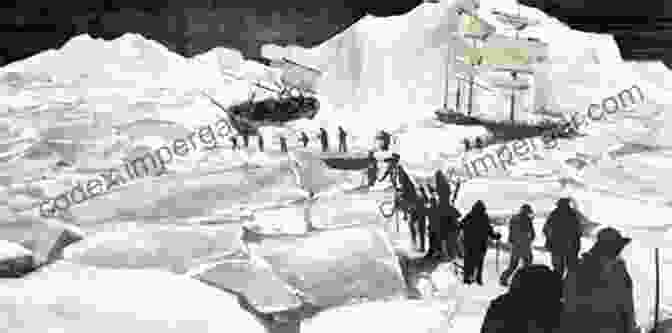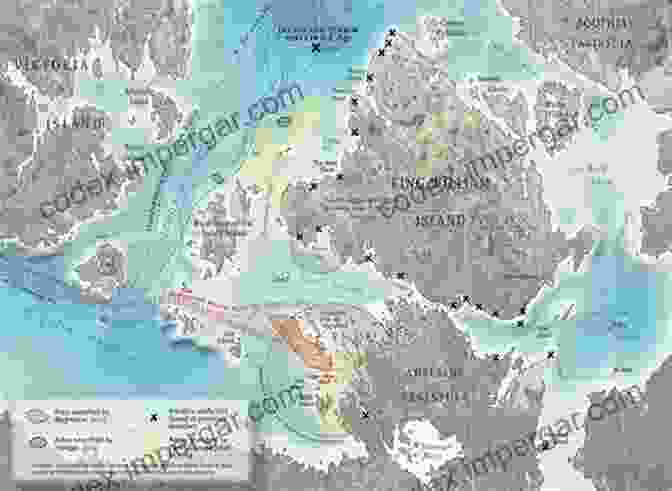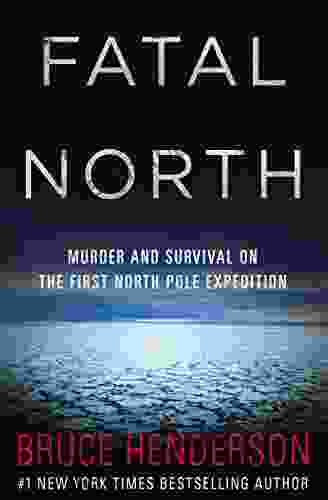Murder and Survival On The First North Pole Expedition: A Gripping Tale of Tragedy and Human Endeavor

Prologue: The Allure of the Frozen North
In the annals of human history, the Arctic has beckoned explorers with its allure of uncharted territories and the promise of fame. As the world entered the 19th century, the quest to conquer the North Pole intensified, a goal that had eluded countless expeditions. It was against this backdrop that Sir John Franklin embarked on an ambitious mission to reach the Earth's northernmost point.

4.5 out of 5
| Language | : | English |
| File size | : | 5678 KB |
| Text-to-Speech | : | Enabled |
| Screen Reader | : | Supported |
| Enhanced typesetting | : | Enabled |
| Word Wise | : | Enabled |
| Print length | : | 283 pages |
| Lending | : | Enabled |
The Fateful Departure
On May 19, 1845, HMS Erebus and HMS Terror, two ships under the command of Sir John Franklin, set sail from Greenhithe, England. The expedition, comprising 129 officers and crew, was well-provisioned and equipped with the latest navigation technology, including magnetic compasses and chronometers. Franklin's mission was to find the Northwest Passage, a mythical route connecting the Atlantic and Pacific oceans through the Arctic Archipelago.
Disaster Strikes
The expedition sailed north along the coast of Greenland, then westward across Baffin Bay. However, disaster struck in August 1845, when the ships became trapped in ice near King William Island, Canada. With the ships immobilized, the crew was forced to abandon them and trek overland in the unforgiving Arctic wilderness.

Survival and the Agony of Cannibalism
Months turned into years as the crew battled starvation, exposure, and disease. In a desperate bid to survive, they resorted to cannibalism, consuming the bodies of their deceased comrades. Autopsies conducted on the remains of expedition members later revealed evidence of this grim practice.
The Discovery of the Lost Expedition
Over the next decade, numerous search expeditions were launched to locate Franklin and his crew, but none succeeded until 1859. Lieutenant Francis Leopold McClintock, leading a British search team, finally discovered the remnants of the expedition on King William Island. He recovered fragments of journals, records, and the remains of crew members, providing a chilling account of their tragic fate.
The Mystery of the Franklin Expedition
To this day, the exact cause of the Franklin expedition's demise remains shrouded in mystery. While the discovery of cannibalism sheds light on the desperation that consumed the crew, it does not fully explain the expedition's ultimate failure. Theories abound, ranging from navigation errors to scurvy and lead poisoning.

Murder and Intrigue: The Dark Underbelly of the Expedition
As researchers delved deeper into the expedition's records, a disturbing pattern emerged. Evidence indicates that murder may have occurred among the desperate and starving crew members. Lieutenant James Fitzjames, second-in-command of the expedition, was found with a gunshot wound to the head, raising suspicions of foul play. Other crew members died under unexplained circumstances, leading to speculation of internal conflicts and mutiny.
The Endurance and Legacy of Franklin's Crew
Despite the tragedy that befell the Franklin expedition, their story serves as a testament to human endurance and determination. Their unwavering spirit in the face of adversity inspires awe and admiration. Their legacy lives on through the numerous landmarks named after them in the Arctic and the enduring fascination with this chapter in exploration history.
Epilogue: Lessons from the Arctic Tragedy
The Franklin expedition's tragic end provides valuable lessons for modern-day explorers and adventurers. The importance of meticulous planning, risk assessment, and teamwork cannot be overstated. By studying the failures and successes of past expeditions, we can better prepare for the challenges and dangers that lie ahead in the pursuit of exploration.
4.5 out of 5
| Language | : | English |
| File size | : | 5678 KB |
| Text-to-Speech | : | Enabled |
| Screen Reader | : | Supported |
| Enhanced typesetting | : | Enabled |
| Word Wise | : | Enabled |
| Print length | : | 283 pages |
| Lending | : | Enabled |
Do you want to contribute by writing guest posts on this blog?
Please contact us and send us a resume of previous articles that you have written.
 Book
Book Novel
Novel Page
Page Chapter
Chapter Text
Text Story
Story Genre
Genre Reader
Reader Library
Library Paperback
Paperback E-book
E-book Magazine
Magazine Newspaper
Newspaper Paragraph
Paragraph Sentence
Sentence Bookmark
Bookmark Shelf
Shelf Glossary
Glossary Bibliography
Bibliography Foreword
Foreword Preface
Preface Synopsis
Synopsis Annotation
Annotation Footnote
Footnote Manuscript
Manuscript Scroll
Scroll Codex
Codex Tome
Tome Bestseller
Bestseller Classics
Classics Library card
Library card Narrative
Narrative Biography
Biography Autobiography
Autobiography Memoir
Memoir Reference
Reference Encyclopedia
Encyclopedia Theodor W Adorno
Theodor W Adorno Brenda M Beasley
Brenda M Beasley Bruce A Bleakley
Bruce A Bleakley Bob Carss
Bob Carss John Kerr
John Kerr Craig Fraley
Craig Fraley Donngal Mac Ronain
Donngal Mac Ronain Paul Owens
Paul Owens C R Snyder
C R Snyder Bonnie Yochelson
Bonnie Yochelson Stacie Swift
Stacie Swift Matt Howard
Matt Howard Clara Sue Kidwell
Clara Sue Kidwell Dixie Tenny
Dixie Tenny Bobbie Hinman
Bobbie Hinman Bonnie Ruberg
Bonnie Ruberg Maite Sommer
Maite Sommer Clarke Ching
Clarke Ching Joseph L Badaracco Jr
Joseph L Badaracco Jr Bryan Collins
Bryan Collins
Light bulbAdvertise smarter! Our strategic ad space ensures maximum exposure. Reserve your spot today!
 Graham BlairFollow ·13.9k
Graham BlairFollow ·13.9k Blake BellFollow ·3.9k
Blake BellFollow ·3.9k Joe SimmonsFollow ·14.3k
Joe SimmonsFollow ·14.3k Oscar WildeFollow ·2k
Oscar WildeFollow ·2k Donovan CarterFollow ·10.4k
Donovan CarterFollow ·10.4k W.H. AudenFollow ·3.1k
W.H. AudenFollow ·3.1k Cortez ReedFollow ·4.1k
Cortez ReedFollow ·4.1k Caleb CarterFollow ·12.2k
Caleb CarterFollow ·12.2k

 Gary Cox
Gary CoxUnlocking Meaning and Purpose in Life: An Exploration of...
In an increasingly...

 Eric Hayes
Eric HayesMemoirs of the Early Pioneer Settlers of Ohio Illustrated
A Window into the Lives of Courageous...

 J.R.R. Tolkien
J.R.R. TolkienThe Montgomerys and Their Descendants: A Saga of Courage,...
Prepare to be...

 Avery Simmons
Avery SimmonsThe Rifle Musket: The Dawn of Modern Infantry Warfare
: The rifle musket, a revolutionary...

 Jesse Bell
Jesse BellUnlock the Power of Excel with VBA and Macros: A...
Microsoft Excel is a powerful spreadsheet...
4.5 out of 5
| Language | : | English |
| File size | : | 5678 KB |
| Text-to-Speech | : | Enabled |
| Screen Reader | : | Supported |
| Enhanced typesetting | : | Enabled |
| Word Wise | : | Enabled |
| Print length | : | 283 pages |
| Lending | : | Enabled |














